COUNTERCOURSE ORIENTATION & HANDBOOK

THE REAL STUDENT


Students' Representative Council Orientation Guide for University of Sydney Students




Students' Representative Council Orientation Guide for University of Sydney Students
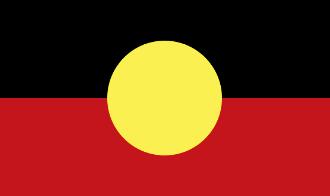

The SRC recognises that the University of Sydney occupies and operates on unceded Gadigal Land of the Eora Nation, which was stolen through processes of violent dispossession.
The SRC is surrounded by the significant area of Redfern, which has birthed the Aboriginal Legal and Medical Services, and served as the home of the Aboriginal land rights movement of the 1970s. We pay our respects to the Elders past and present of the Country that we live, study and organise on.
We, as the SRC, are striving towards allyship which means to be amplifying First Nations voices, prioritising sovereignty, and centring their demands in our advocacy and activism.
In so-called "Australia," the rates of imprisonment, deaths in custody, homelessness, life expectancy, and child removals for First Nations peoples are unacceptable. Racism and inequality are baked into our systems and society, hidden behind the myth of the "Australian dream" and a "multicultural society."
We acknowledge that the University of Sydney exists as an elitist, 'sandstone' education institution on stolen Gadigal land. The University was built using sandstone stolen from Gomorrigal and Wangal land, the timber of ancient cedar forests on Bundjalung land, and marble from the land of the Gundungarra people.
As an example of this colonial legacy, the University is home to the Wentworth Building, the university literary Wentworth Medal prize, and a statue dedicated to William Charles Wentworth, a key coloniser of the area who paved the way for frontier violence against First Nations people. Throughout his life and particularly as an elected representative to the Legislative Council of NSW, Wentworth was a firmly powerful and racist figure who defended the punitive murders of Aboriginal people. While some may choose to remember him as a proponent of universal and secular education who helped build the University, he is a shameful figure that we should not commemorate.
ALWAYS WAS, ALWAYS WILL BE ABORIGINAL
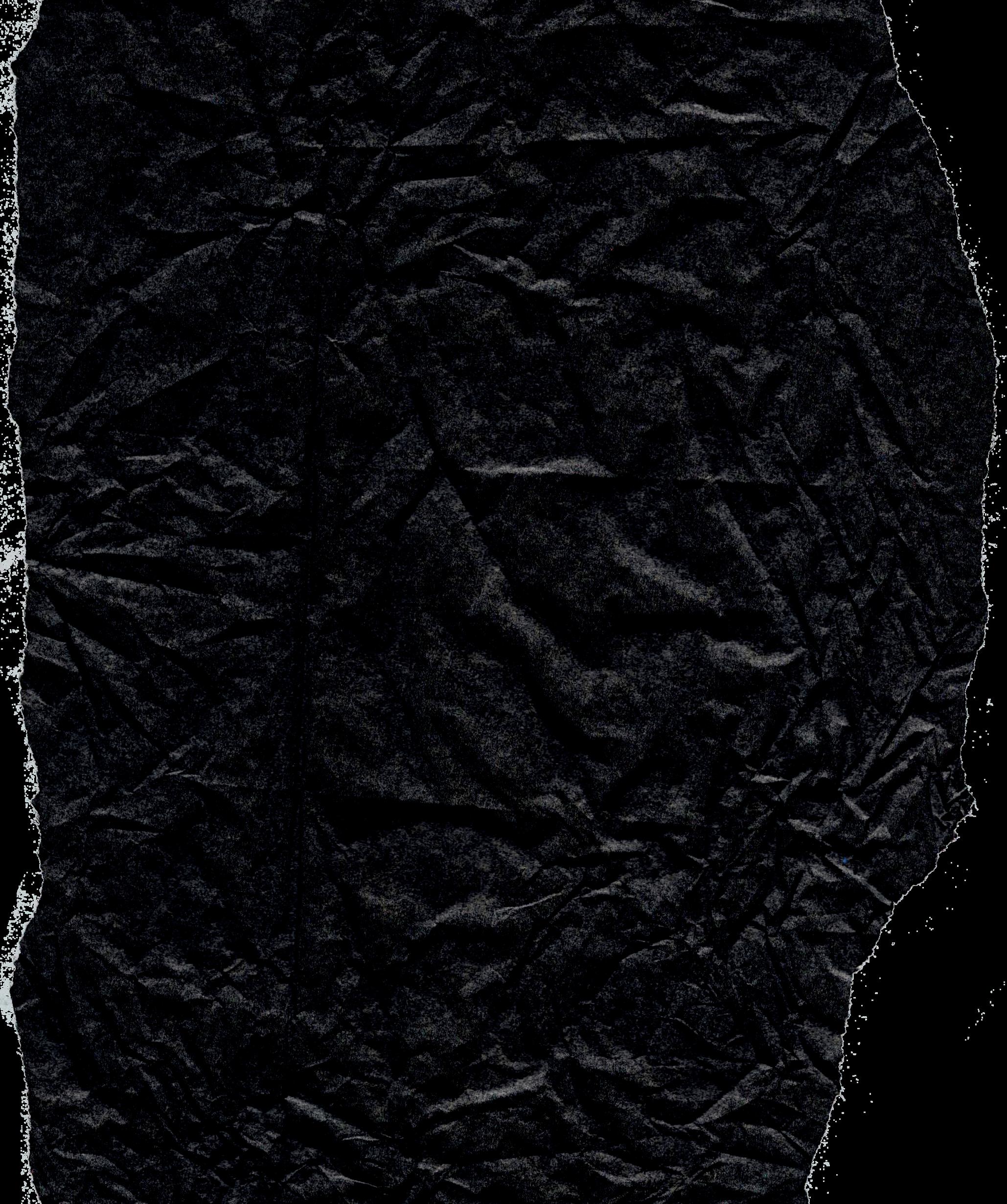

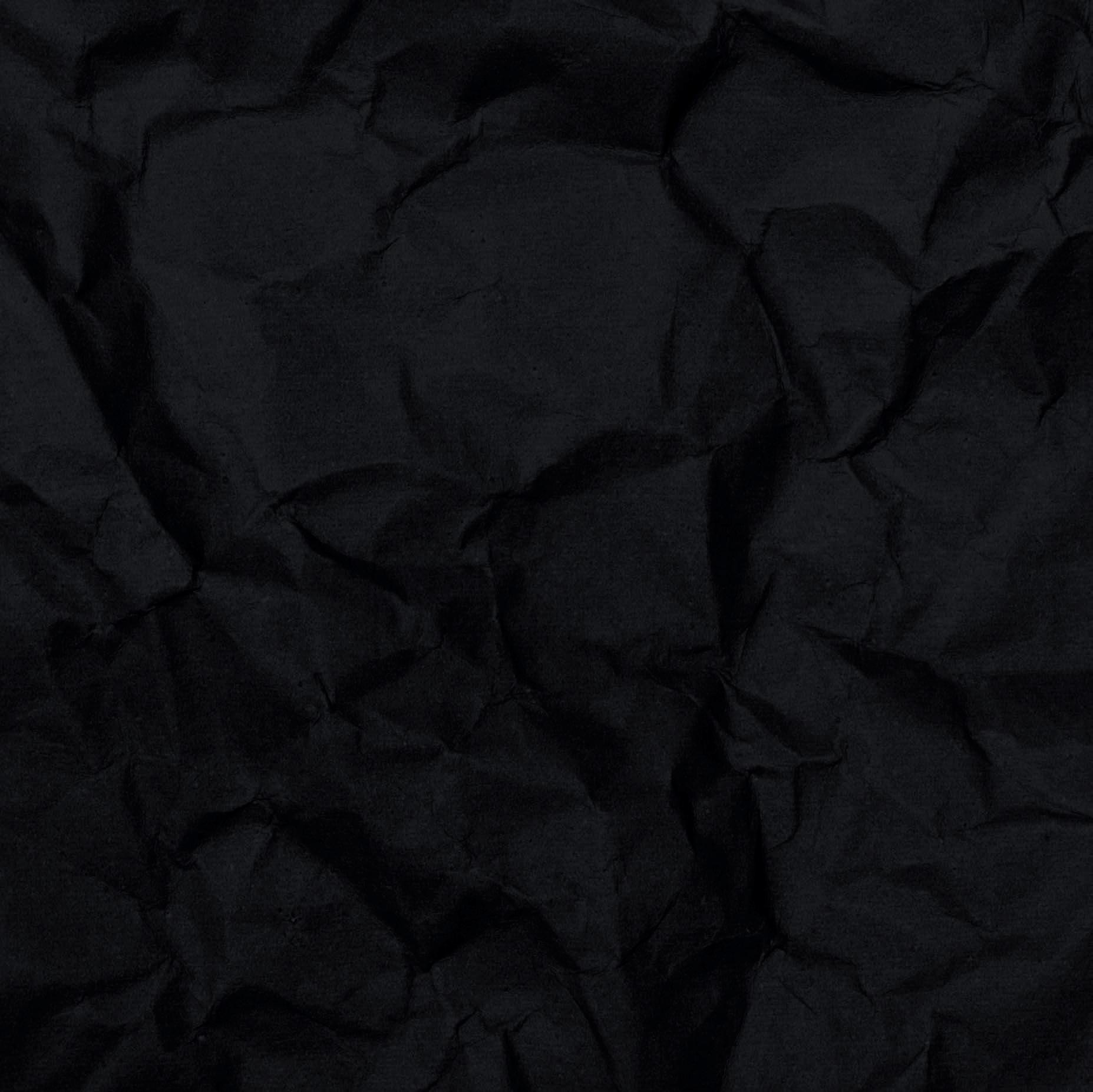
p.4 p.5 p.6 p.8
Editorial from the General Secretaries
President’s welcome
What is the SRC?
Our structure & services
The SRC’s collectives and student media
Our guide to surviving on little money
Accommodation tips & renters’ checklist
First years’ university checklist
Useful everyday applications
Academic help and services
Student or academic misconduct
International student guide
The SRC’s USyd map
USU clubs and societies
The StuPol dictionary
More resources and links
COURSE ADVICE & REVIEWS
Arts and Social Sciences
Business
Law
Science, Health & Medicine
Engineering
Music
Architecture, Design and Planning
EDITORS-IN-CHIEF:
Anu-Ujin Khulan and Grace Street, 2025 SRC General Secretaries WITH THANKS TO...
Grace Street for the amazing contents
Anu-Ujin for the amazing cover art and Handbook designs
The SRC Casework Team and Melissa De Silva for their guides and resources
The ISC for their International Student Handbook section
The students gave advice and tips to new students in their courses
The CSA and SASS for their contributions
All of the SRC staff who keep the SRC alive and running
The SRC Publications Managers for all of their work and support
Our SRC Office Bearers - here’s to a great 2025!
THE BACK HALF OF THIS HANDBOOK IS THE SRC EDUCATION ACTION GROUP’S (EAG) ANNUAL PUBLICATION ‘COUNTERCOURSE’. FLIP THE HANDBOOK OVER AND CHECK IT OUT!



Hello, we are your 2025 General Secretaries, Anu and Grace!

Welcome to the 2025 SRC Welcome Handbook! This publication has long been a staple of the SRC, often dubbed “the no bullshit guide” USyd students.
In a University that has an undergraduate population of more than 40 000 students, it is so easy for new (and old) students to feel left behind or unwelcome. Unfortunately, the University of Sydney also has a tendency to fail its students, as it seeks to everincrease its profits and pushes student satisfaction and safety to the side. We are independent of the University and all of our services are FREE. As the SRC, our job is to advocate, represent and lead activism for USyd undergraduate students to try to make our lives and education as good as they can be.

READ THE HANDBOOK. PLEASE. We’re not just saying this because we have invested a lot of time and effort into it, but because it has information, tips, advice and resources that could (literally) save your life. In the SRC, as student representatives and with our casework and legal departments, we are uniquely placed to know what issues students are facing and how to solve them. Whether it be Australia’s current cost-of-living crisis or the University’s crackdown on special considerations and student protest, we have tools and resources for you to stay afloat, and lots of groups and campaigns for you to join to fight against these problems.
For any information you can’t find in the Handbook, check out the SRC website, contact the caseworker or legal service, or drop into the SRC office on the bottom floor of the Wentworth Building (find the stairs outside City Rd bus stop).
Also feel free to reach out to us if you have questions or want to get more involved! Our email is general.secretary@src.usyd.edu.au and we don’t have any GenSec social media accounts (yet?), but you can get in touch with our Instagrams @gracestreet__ and @nji_un_
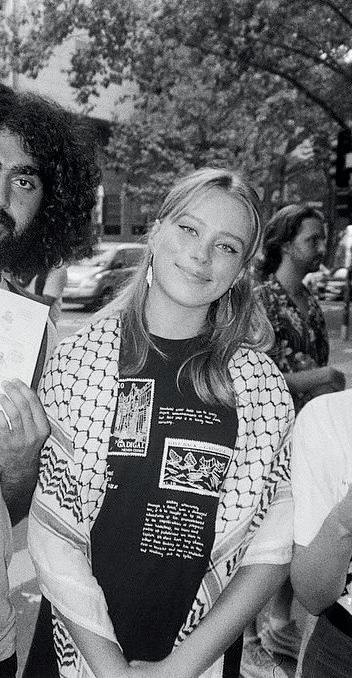

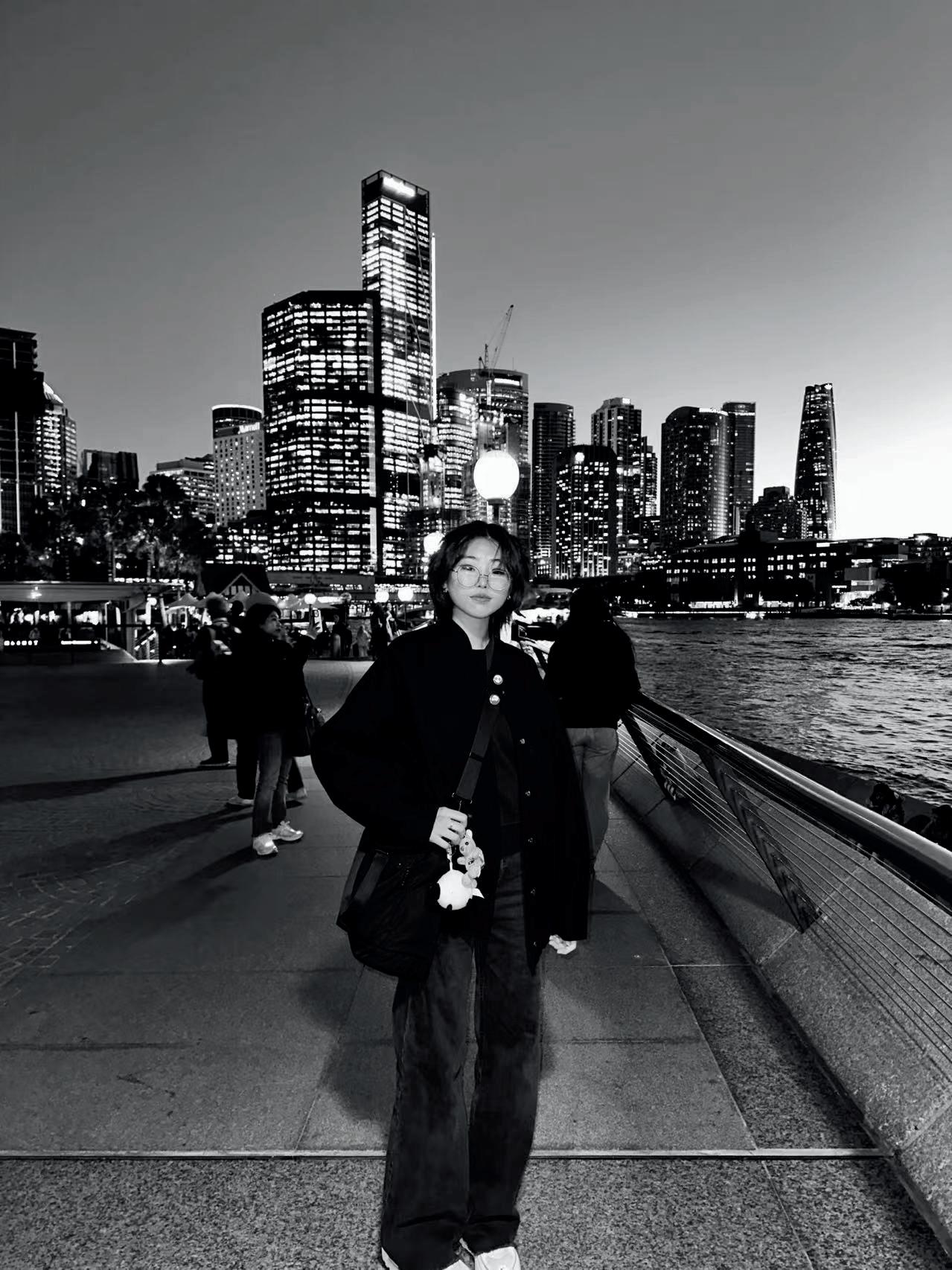

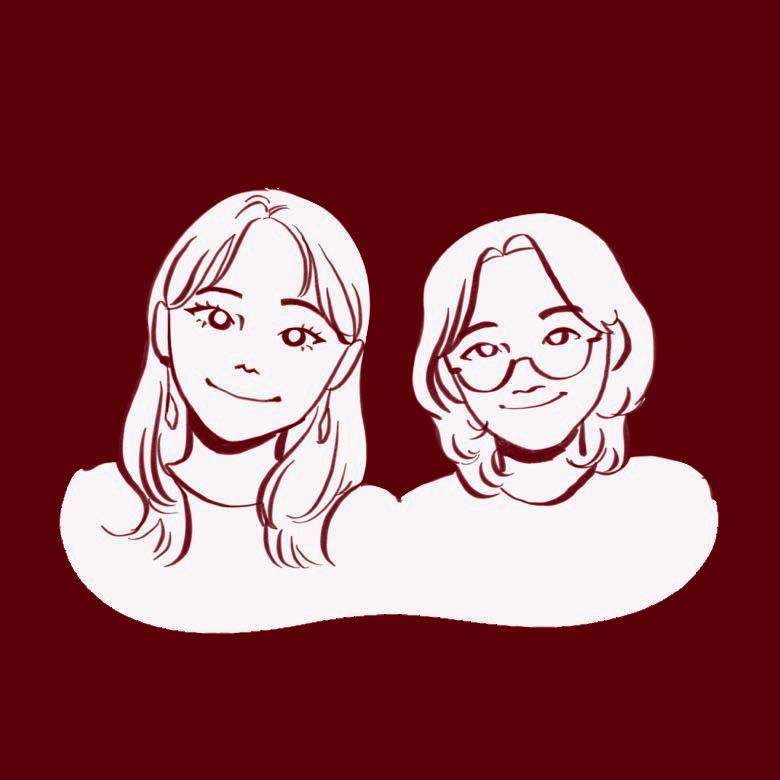


Whether you’re a new or returning student, the SRC is here to support you in every way it can; be that through our excellent casework and legal services, our robust student-focussed campaigns, or just being a familiar face on campus.
The SRC is your student-run student union and is totally independent of the university so whenever you’re having issues with them, or frankly, any problems related to being a student or young person, we are your go-to people. If you have ever wondered where that approximately $200 Student Services and Amenities Fee (SSAF) that you pay each semester goes, part of it helps fund our important work.

I have been asked a lot: “What does the SRC President actually do?” I will attempt to answer this question as concisely as possible. I see the role as three broad responsibilities, all of huge importance. Firstly, the President is the executive director of the not-for-profit organisation that is the SRC. I oversee all the staff that the SRC employs and ensure the organisation is running as it should by putting student’s interests first. Secondly, the President is the undergraduate student representative. I attend countless meetings and answer an ungodly amount of emails from the university, the government, and the media to make sure the interests of the approximately 40,000 undergraduate students are heard. Finally, the President is the lead union organiser. I help facilitate campaigns that the SRC office bearers wish to run and try to engage with the student body (you) to get involved. Students are stronger together.
I am proud to be the SRC President because the SRC has a rich history of social justice by fighting for student rights and broader societal issues through its activism and advocacy since 1929. The SRC has played a pivotal role in movements for educational reform, anti-war protests, environmental sustainability, LGBTQIA+ rights, and gender equality. Notably, the SRC was at the forefront of opposition to the Vietnam War and campaigned for free and accessible education during the economic reforms of the 1980s. With a deep commitment to intersectional justice, the SRC continues to champion causes such as workers’ rights, Indigenous sovereignty, and climate action, embodying its legacy of progressive activism. The best way to get involved in the SRC’s campaigns is through its collectives which you can find on the SRC website or by getting in touch with me.
Students and the greater world face many challenges today that the SRC tries to fight. First and foremost is the corporate university, which seeks to maximise profits by cutting courses and staff while making hundreds of millions in surplus. Our education is becoming increasingly commodified. The cost of living crisis continues to hit young people the hardest with soaring rents and food prices. It’s more important than ever that the government hears our struggles. The university’s complicity in the Palestinian genocide, climate change, and other injustices are rife. The SRC is one-way students can fight for what’s right. Over the past couple of years, student unionism has won an independent student ombudsman, partially paid placements, and the disclosure of ties to weapons companies at many universities. Student unionism works.
I hope to see you all around campus this year and getting involved with your SRC. This year we will be hosting a fortnightly stall/BBQ on Eastern Avenue so you can raise issues directly with us. Please follow the SRC Instagram @src_usyd to keep up with what we’re doing and feel free to look me up personally on social media. Thank you for reading!
In solidarity, Angus Fisher






USyd’s undergraduate student union Australia’s most active and strongest student union home to Australia’s only student weekly print newspaper, Honi Soit affiliated with the National Union of Students (NUS) independent of the University the University’s dirty little secret and frenemy* funded by a little bit of your semesterly SSAF payments

SUPRA (the USyd Postgraduate student union) wasting your SSAF money the USU (University of Sydney Union, who cover the clubs & societies, food outlets and cafes, and events, gigs and parties side of campus life)

*The university likes that we provide free casework services to students so that they don’t have to deal with it themselves or fix their broken bureaucratic systems. Otherwise they hate us for opposing them on things like their investments in fossil fuels and weapons companies, support for the residential colleges which host a culture of elitism and sexual violence, and everything else wrong with the corporate university.
Each year, we elect one representative per thousand students of the undergraduate student population. In 2025 during the 97th SRC, we have 39 councillors that meet monthly to hear reports from office bearers and to vote on motions to guide the direction of the SRC. The Council acts as the board of the SRC. Normally, councillors are elected each year in Semester 2 with an in-person election.
At the annual Representatives Elect meeting at the end of Semester 2, the new councillors will vote to elect undergraduate students as office bearers for various executive, collective convenor or other positions, as explained over the page. Check out the full list on pages 8-9!

Honi Soit (pronounced on-nee swa) is the SRC’s weekly student newspaper who work alongside the Publications team. The Honi Editors are directly elected in the SRC’s annual Elections. While they have editorial control, the Publisher is the SRC, and our team of 6 Directors of Student Publications check for legal liabilities in each week’s edition. Sometimes (or often) we do publish juicy things and get sued! See more about Honi Soit on page 9.
The day-to-day operations of the SRC are overseen by an executive consisting of the President, 1-2 Vice Presidents, 1-2 General Secretaries, and 5 General Executive members. We meet regularly to hear reports from staff, caseworkers and the legal team, to check up on the campaigns of our office bearers, to approve spending, and to ensure that the SRC remains compliant with the Australian Charity and Not-for-profit Commission.
We work with our wonderful secretary, and admin and accounts teams, to keep the SRC running!

This is where the magic happens. The SRC conducts most of its activist organising, campaigns and advocacy through the collectives which are run by elected Office Bearers. Some of these autonomous (meaning exclusive to people of the relevant group), such as the Women’s Collective, Autonomous Collective Against Racism, Disabilities and Carers Collective, International Student Collective, and Queer Action Collective. Check out the whole list and find out how to join on pages 8-9!
*For postgraduate students, see
*For postgraduate students, see SUPRA (Sydney University SUPRA (Sydney University Postgraduate Representative Postgraduate Representative Association) for equivalent services Association) for equivalent services

The SRC employs full-time staff to work in the Casework and Policy Department that advises individual students with academic and university-related matters, tenancy issues, and Centrelink questions. This service is free, confidential, and independent of the University. Find out more information about them and their services on the SRC website (srcusyd.net.au)
We have dedicated Office Bearers to work in the following SRC departments with smaller budgets to work alongside the collectives:
First Nations
Global Solidarity
Intercampus
Interfaith
Mature Age Students
Refugee Rights
Sexual Violence
Social Justice
Student Accommodation
Check out the full list of collectives on the next page!

The SRC Legal Service was established in 2011 to provide students with free legal advice and advocacy in legal matters including employment, criminal, and immigration law. The Legal Service has an incorporated status and operates as a separate entity. Find more information about them and their services on the SRC website (http://srcusyd.net.au)
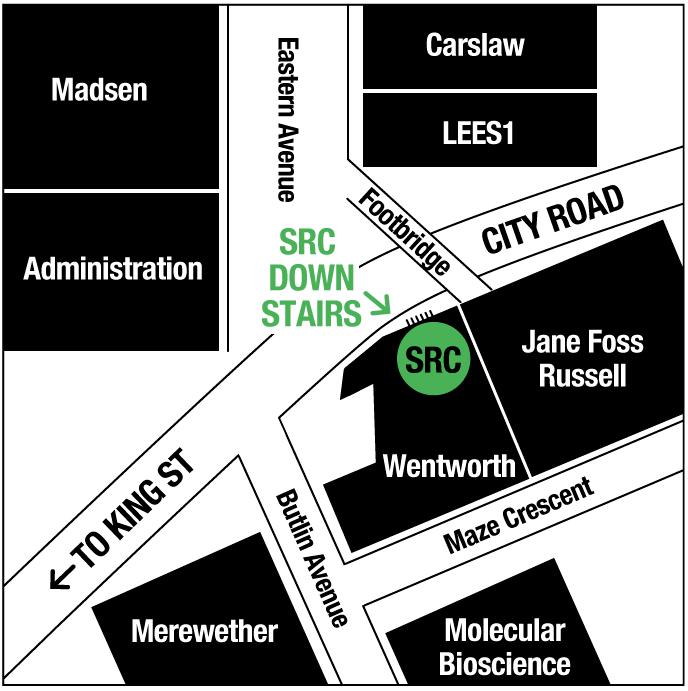

WoCo Convenors: Martha Barlow & Ellie Robertson
The Women’s Collective (WoCo) is radical, left wing feminist group organising on unceded Gadigal land at the University of Sydney. We are an autonomous group, meaning we are open to anyone who is not a cis man. Our feminism is anti-capitalist, anti-racist, decolonial, and proqueer. We organise around issues like sexual violence, abolishing the colleges, First Nations justice, Palestinian liberation, reproductive justice and femicide. If you’d like to attend a meeting, join a rally, come to a reading group, write for a publication or attend an event, follow our Instagram @usydwoco, and check out our linktree!
Check out: Growing Strong - WoCo’s Welcome Week publication
Stay tuned for: Reclaim and Resist Week in Week 10 Sem 1: a week of feminist actions, workshops and events
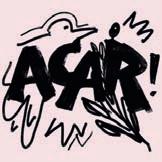
ACAR Convenors: Kayla Hill & Dana Kafina
ACAR is an autonomous collective open to current University of Sydney students who identify as Aboriginal and/or Torres Strait Islander, who come from a minority ethnocultural background, who are marked or marginalised by white supremacy, or who identify as a 'person of colour'. We work with allies and other collectives to organise around issues relating to people of colour, both within and beyond USyd, in activist and educational ways. Notably, we will focus on the fight for the fight on Indigenous justice in socalled Australia, advocating for Palestinian liberation, refugee rights, international solidarity actions, and for liberation worldwide.
Socials: @usydacar on Instagram Link Tree:
DisCo Convenors: Remy Lebreton & Vince Tafea
The Disabilities Collective and Caregivers Network (DisCo) is an autonomous collective for undergraduate students with disabilities and student carers.
DisCo is an activist space where we as disabled students come together to organise around and fight for disability justice! Beyond this, we also collaborate with other campaigns and collectives because all of our liberation is intertwined. One Struggle.

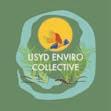
BTW, we have a cool room you can chill in, use the soundproof booth or fridge, and nap called the Disabilities Space on Level 1 of Manning House! Check us out online and apply for Disabilities Space access here:
Enviro Officers: Deaglan Godwin & Lilah Thurbon
The Enviro Collective is a left-wing, activist collective within the SRC dedicated to fighting for real action on climate change and environmental justice. From apocalyptic scenes coming out of the California wildfires to Israel’s genocide in Gaza causing unprecedented environmental destruction, this year will be a big one for environmental action. So, join us as we organise actions on and off campus, protesting issues like USyd’s investment in fossil fuels and the Albanese government’s reckless approval of new coal and gas projects. We’re also committed to fighting against the repression of protest and dissent that characterises our political landscape, from the Campus Access Policy to laws imposing harsh punishments on protestors brought in to stifle climate activism.
Check out: Combust, Enivro’s Welcome Week publication Find out more using our Linktree:
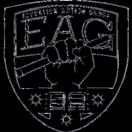
The Education Action Group (EAG) is an activist collective dedicated to fighting for free, quality education. As the largest of the SRC’s collectives, the EAG campaigns for a wide range of issues, ranging from opposing cuts to courses and staff wages to wider social justice issues and more.
In 2021, we successfully resisted the University’s proposed abolition of the schools of Theatre and Performance Studies and Studies in Religion. In 2022 and 2023, we organised a solidarity campaign with the staff union (NTEU) as they went on strike for better pay and working conditions, mobilising student contingents to participate in the picket lines. In 2023 and 2024, we highlighted our University’s investments in weapons companies that are complicit in the apartheid and genocide in Palestine. We organised the Gaza Solidarity Encampment, and the Student General Meeting, which saw over 700 students vote to call on the University to cut its ties with Israel and support Palestinian statehood.
In 2024 and heading into 2025, we are continuing our campaign to support free speech on campus, which has been under threat from University management, while we carry on protesting the ongoing cuts to courses that the University is attempting to ram through. We are a movement that is only as strong as our members, so we hope to see you around!
Check out: the back half of this handbook for the Education Action Group’s “Countercourse” Look out for: Radical Education Week in Sem 2, put on by the EAG and General Secretaries
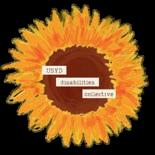
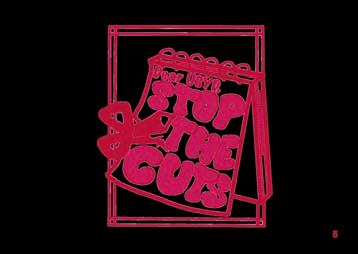



International Student Officers: Bob Song, Christine Peng, Mary Liu & Ethan Cao

The International Student Collective (ISC) is a group dedicated to ensuring the representation and welfare of international students within the University of Sydney and wider Australia. We understand that life overseas can be extremely difficult, and work to host social events and information panels so that international students can feel a sense of belonging and community throughout their time here.
Furthermore, we recognise the systemic injustices international students face. From a lack of Concession Opal Cards to the proposed student cap policies, we organised to fight back against these blatant inequalities and ensure equal rights and privileges for ALL students.
If any of this sounds interesting, whether it be our organising or our social events, feel free to scan the QR Code and come along to a meetup! Everyone is more than welcome!!

Welfare Officers: Annabel Pettit & Mia Williams
Check out pages 26-27 of this Handbook for the International Student Collective’s 2025 International Student Guide
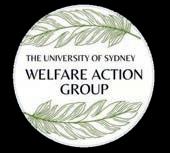
Hey! The Welfare office campaigns for student rights and social justice through the USyd SRC. Previously we’ve been involved in organising the USyd Gaza solidarity encampment to call for the university to cut ties with Israeli genocide, as well as campaigns to call for affordable student accommodation on campus. We’re excited to continue representing students this year by standing up against the uni management’s proposed course and job cuts together with the Education Action Group. Flick us an email or stop by the SRC stall anytime during Welcome Fest to say hi and find out more about how you can get involved with activism on campus!
check us out on Instagram @usyd.welfare.action

Check out the 2025 QuACtivist Handbook to read more about QuAC, queer events, and more
We currently have two vacant positions for the First Nations Students’ Collective convenor. Please contact us if you are interested in continuing the imperative work of this group of First Nations activists and allies at USyd!
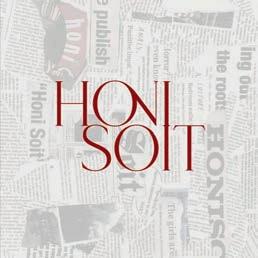

Honi Soit is the University of Sydney’s weekly student newspaper, the only one of its kind in Australia. Printed since 1929, it has always platformed student voices and raised awareness of issues important to students. Our coverage includes news, analysis, opinion, campus goings-on, reviews and more, and any student is welcome to write for us or contribute artwork. Our contributor forms can be found on our Instagram which is in the link below, and there is no experience required. The newspaper is freely available hot off the press, every Wednesday morning, on stands dotted all over campus (check Fisher Library if you can’t find it)!
Stay tuned for: Pitch ‘n Bitch sessions for editors and Honi Soit contributors, reporter information events and a new Reporter Handbook, artist events, and the 2025 Student Media Conference
Check out this Linktree to apply to be an Honi Soit reporter, artist or photographer, to pitch a piece, to submit an anonymous tip or to the advice column, and to find the online website and social media platforms:






For full-time students that are Australian citizens or residents. If you are a part-time student because of illness, disability, or Uni requirements, you may also be eligible for a payment.
Centrelink has many bureaucratic hurdles, but don’t let that stop you from getting payments you deserve to support you as you focus on your education. If you have a phone conversation ask them for a receipt number, and email that together with a short description of what you spoke about to yourself, so that you have a record.
Phone enquiries often take one and a half to two hours to answer - often the wait is shortest if you call as soon as they open.
Always report any changes in your circumstances, including moving house, getting a new housemate, changing subjects, getting an inheritance or scholarship, going overseas, or changes in your relationship status. Anything that happens that you do not report can be used as a reason to penalise you (financially) or stop your payment.
The SRC strongly advises you against taking out loans advertised on social media, and instead talk to a caseworker about viable alternatives.
Visit the SRC website to find information for International Students about wages, tax, superannuation and trade unions in Australia.
Join your trade union! Unions will protect your work rights individually and collectively, and their fees are tax deductible. To join, go to www.australianunions .org.au/join

There are also telephone advice lines including the National Debt Help Line and the Gambling Help Line.
If you are struggling with debt, we also recommend you meet with a Financial Counsellor to provide confidential assistance.
The SRC Legal Service may be able to help negotiate suitable repayments for debts.
Be very cautious of debt consolidation agencies as often the interest rates mean that you will never repay your debts and can lead to bankruptcy.
Beware of the high penalties for late repayments of interest free periods on loans, and partial payment schemes such as Afterpay and Ezipay.
If you have any questions about Centrelink, start by looking at the SRC's website that has information on the many processes, rules and hurdles associated with Centrelink, including:
The different payments available for students
Being assessed as independent
How earning money affects your Centrelink payment
The impact of your parents' income
The impact of your savings when applying for a payment
The impact of being in a relationship
If you are struggling to pay your energy bills, call your energy provider as soon as possible. They can offer a range of assistance, including payment extensions, payment plans, and hardship programs, as well as information about concessions, rebates, and other support. You may also be eligible for an Energy Accounts Payment Assistance voucher for a once off payment towards your bill. You can also reduce your "bill shock" by paying a small amount each week.
Pre-paid accounts allow you to monitor your usage and keep track of your weekly spending. Being locked into a contract can reduce the monthly price but might end up cost more if you need to move house or change providers. Free alternatives include using the University's or local councils’ internet to make phone calls and send messages through apps like Signal, Facebook messenger, Wechat, and Whatsapp (but keep in mind that they may use or sell your private information).







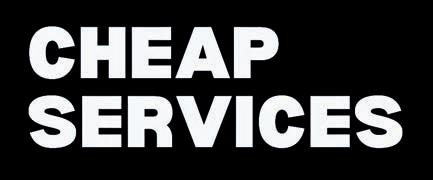

The University has a free Counselling Service that provides a limited number of appointments. Longer term mental health care can be sought through private psychologists. They are often very expensive, so find out about the subsidy available through a mental health plan (domestic students), or your OSHC provider (international students). There are a few services that will bulk bill or charge no or a small gap fee (Uplift Psychological Services, or eHeadSpace).
You could also contact local psychologists your area and ask if they can discount their fee.
There is a Psychology Clinic linked to the School of Psychology, providing counselling and may also do testing for conditions (including ADHD), for a fee.
Medicare has limited options for free dental care. International students should check their insurance provider to see what services are included.
Domestic students could consider the benefit of getting dental insurance too.
Available to most students on a Centrelink payment, or low-income Australian citizens (or PR). You will be entitled to: reduced pharmaceuticals, free ambulance cover, access to free dental care (though the waiting lists are a few years long), free prescription lenses and some frames, and discounts to some alternative medical practices.
The University Health Service (Wentworth Building) provides bulk billing for domestic students and direct billing for Allianz OSHC.
Some other doctors' surgeries will not charge a “gap fee”, especially for fulltime students, but always check when making a booking.
NSW Health offers comprehensive information on many different types of alcohol and other drugs. For free needles and a safe point of disposal check the NSW Needle and Syringe Program. If you are accused of possession of illegal drugs, say nothing to the Police until you speak to a solicitor (the SRC has a free legal service).
Have as much consensual & safe sex as you would like! The SRC can provide you with free condoms and lube, as can various sexual health providers and family planning clinics.








SCAMS:
DO NOT SIGN AN AGREEMENT OR TRANSFER MONEY WITHOUT INSPECTING THE PROPERTY, AND ALWAYS GET A RECEIPT, NOT JUST AN ELECTRONIC BANK TRANSFER RECORD.
IF YOU HAVE BEEN ASKED TO PAY A DEPOSIT OR BOND VIA A MONEY TRANSFER SERVICE (E.G. WESTERN UNION), IT IS ALMOST ALWAYS A SCAM.
BONDS AND DEPOSITS:
RESIDENTIAL TENANTS WILL USUALLY PAY A BOND OF NO MORE THAN THE EQUIVALENT OF 4 WEEKS RENT THAT IS MEANT TO BE KEPT BY THE NSW RENTAL BOND BOARD, AND YOU SHOULD RECEIVE A RECEIPT WITHIN A COUPLE OF WEEKS OF MOVING IN DEPOSITS (LIKE A BOND FOR OTHER TYPES OF RENTERS) HAVE NO RULES, SO MAKE SURE YOU KEEP A COPY OF THE RECEIPT. YOUR BANK STATEMENT WILL NOT ALWAYS BE CONSIDERED A RECEIPT.
FLEEING DOMESTIC AND FAMILY VIOLENCE: IF YOU ARE FLEEING DOMESTIC AND FAMILY VIOLENCE THERE ARE ADDITIONAL SUPPORTS THAT MIGHT BE AVAILABLE TO YOU, RELATING TO EMERGENCY ACCOMMODATION, ACADEMIC SUPPORT, LEGAL HELP, AND COUNSELLING. YOU CAN TALK TO AN SRC CASEWORKER AND CHECK OUT OUR FULL LIST OF HOTLINES AND RESOURCES ON PAGE 32 EMERGENCY OR TEMPORARY ACCOMMODATION FOR THOSE EXPERIENCING HOMELESSNESS
SRC CASEWORKERS MAY BE ABLE TO HELP YOU WITH SOME (LIMITED) TEMPORARY AND EMERGENCY ACCOMMODATION. IF IT IS OUTSIDE OF BUSINESS HOURS CALL LINK2HOME ON 1800 152 152. FREE FURNITURE ETC.
OP SHOPS CAN PROVIDE CHEAP OR FREE FURNITURE AND APPLIANCES. VISIT AFFLUENT SUBURBS ON THEIR COUNCIL CLEAN UP DAYS FOR THINGS THEY NO LONGER WANT.
THE BOWER IN MARRICKVILLE ALSO HAS SECONDHAND FURNITURE AND SMALL APPLIANCES CHECK OUT ONLINE GROUPS LIKE FACEBOOK MARKETPLACE, FREECYCLE, PAY IT FORWARD, ROUGH TRADE, AND BUY SWAP SELL.
SHARE HOUSING:
SHARE HOUSING CAN BE AN EXPERIENCE THAT RANGES FROM REALLY FUN AND INVIGORATING, THROUGH TO A SPECIAL TYPE OF HELL. FIND TIPS IN THE SHARE HOUSING SURVIVAL GUIDE AT SHAREHOUSING.ORG
HERE IS A CHECKLIST OF ALL THE THINGS YOU SHOULD CHECK WHEN MOVING INTO A NEW HOME.
1. CHOOSING YOUR HOME: TRANSPORT TO UNI SIGNS OF PESTS OR MOULD, BAD WATER PRESSURE, NOISE WHAT IS INCLUDED IN THE PRICE (E.G., ELECTRICITY, INTERNET)?
2. BEFORE YOU MOVE IN:
READ, READ, READ: MAKE SURE YOU UNDERSTAND THE DOCUMENT YOU ARE SIGNING. WHAT ARE THE START AND FINISH DATES ON LEASE/CONTRACT? WHAT IS THE PENALTY FOR LEAVING EARLY BEFORE YOUR LEASE ENDS?
FULL LEGAL NAME AND ADDRESS FOR THE LANDLORD A COMPLETE CONDITION REPORT INCLUDING PHOTOS OF ANY DAMAGE WEAR YOU SEE GET THOSE RECEIPTS: STORE A DIGITAL COPY OF YOUR AGREEMENT, ALL OF YOUR RECEIPTS (BOND/DEPOSIT AND RENT), PHOTOS OF DAMAGE WITH TIMESTAMPS - EMAIL DOCUMENTS TO YOURSELF SO THEY BACKED UP IN YOUR EMAILS.
3. WHILE YOU ARE LIVING THERE: COMMUNICATE WITH THE LANDLORD IN WRITING VIA EMAIL FOR EVERYTHING. FOLLOW UP ANY PHONE CONVERSATION WITH THE LANDLORD OR AGENT WITH AN EMAIL OUTLINING WHAT WAS SAID OR AGREED TO.
WHEN YOU MOVE OUT:
TAKE PHOTOS SHOWING NO DAMAGE BEFORE YOU MOVE OUT TO AVOID BEING BLAMED FOR DAMAGE CAUSED BY NEW TENANTS SUBMIT BOND CLAIM FORM (LEASES ONLY)
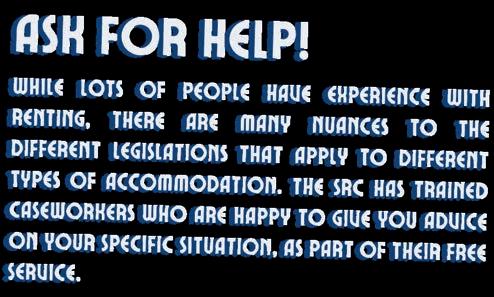
1
2
Set up your UniKey and email, and write them down
Use the USyd 2025 Handbooks for your Faculty or School to find out your degree requirements and compulsory units, or to find out more about elective and selective units of study
3
4
5
6
Log into Sydney Student. Here you can enrol, select units of study, apply for an Opal Concession card (currently only for full-time domestic students), and more
Check Outlook for a link to Allocate+ to put in your preferences for class times for your timetable
Submit a photo for your student ID. Pick it up at the Student Centre and also get a digital copy for your Apple or Google Wallet
Download the important apps to get around, access your email and courses. Check out our list on the following pages!
7
Check Canvas for your each of your courses. Find out who the coordinator is, who your tutor is, when assessments are due and what the required readings or work is for the week ahead.
8
Check where your classes are using your timetable. USyd has multiple campuses and the main Darlington campus is huge, so make sure you know where you’re going and that you have enough time to get there.
9
If you want or need to apply for the Inclusion and Disability Service, complete the Inclusion and Disability Service Request application through the Wellbeing Portal.




Census dates (last day to Census dates (last day to drop a unit without drop a unit without incurring financial or incurring financial or academic penalty) academic penalty)


You must apply within three working days of the assessment deadline through the Uni's Special Consideration portal and provide the appropriate supporting documentation. Medical documentation, e.g., a Professional Practitioner's Certificates (PPC), must be from the day of or before the day of the assessment, from your doctor or a home doctor service to indicate that you were severely affected by your condition. While it is possible to use a statutory declaration (written by you or someone close to you), it is generally not considered sufficient without other evidence or supporting documentation.
Where the faculty is unable to provide an additional supplementary assessment, you will be given a Discontinue Not Fail (DC) grade. You can appeal a rejected special consideration application, within 15 working days. Talk to an SRC Caseworker for details and advice.




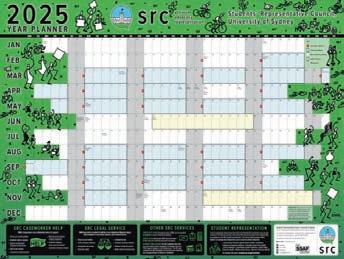


EatClub shows you nearby restaurants with spare tables offering lastminute deals. You can save up to 50% on your bill, including drinks!




Sonder is an app that gives you 24/7 access to safety, medical, and mental health support. It offers real-time safety alerts, journey tracking, and multilingual help via chat, call, or video. You can also access self-help articles, take a wellbeing assessment, and set up discreet safety checkups.
CellOPark: Download the app, log in with your USyd account, and then you may be able to find available on-campus parking on the app and pay $5 max a day.
readings or work is for the week ahead. 6

Check where your classes are. USyd has multiple campuses and the main Darlington campus is huge, so make sure you know where you’re going and that you have enough time to get there

Culture Walk is a great app for exploring Sydney on foot. Learn about the city’s history, discover iconic public artworks and events, and find hidden laneways and unique neighborhoods.
Lost on Campus helps you find smaller things like classrooms, cafes, microwaves, washrooms, lecture rooms, and drinking stations at USYD. Beware, it can be glitchy.











While we may not be fans of Mark Zuckerberg, Facebook is great for finding events, exploring Facebook Marketplace for things like textbooks or furniture, and connecting with community pages for helpful resources. Most of our SRC collectives communicate and organise through Facebook groups or group chats.
Download the USU app to see your digital membership card, latest food and retail offers and events happening on campus.
The University of Sydney app can help you with your timetable, finding your way around campus, and browsing the services available to students.
Use the Canvas app to access your class information and messages from teachers. A tip: enable notifications for things like new announcements so that you don’t miss anything!
To use the recommended Multi Factor Authentication to log into your University accounts, you will need the Okta Verify or Google Authenticator apps.










School of Literature, Art and Media; School of Languages and Cultures; School of Philosophical and Historical Inquiry; School of Social and Political Sciences; School of Economics; Sydney School of Education and Social Work
Kayla Hill, Bachelor of Arts
Philosophy
Reviewing 1000000 arguments about extremely niche yet also broad issues.
Gender Studies
Gay ppl make elementary analysis of gender/sexuality and mention #intersectionality!!
Unit reviews:
FASS1000 is the silliest invention of the university. Do not go to the lectures.
PHIL1011 is such a good intro into all the different types of philosophy you can specialise in as you go into further philosophical study! Go to all the classes.
GCST1602 is the best. It is an incredibly enjoyable intellectual journey with a strong community of peers!
PHIL2617 is a must if you're interested in how moral philosophy can have any use in dealing with issues of the modern age like climate change, poverty, and abortion.
RIP PHIL3640, victim of philosophy course cuts. You were my favourite unit of study taken in the entirety of my time at uni.
If you do PHIL1014, take OLET2148 for an easy OLE - it's basically just a mini version of PHIL1014!
Tips:
Learn (and religiously stick to!!!) the philosophy essay structure. If you can write a good philosophy essay, it becomes so much less intimidating. TALK. TO. EACH. OTHER. Philosophy is hard! Philosophy is also a subject that inherently involves discussion with one another. Be a bit chronically online! Gender studies is all about connecting existing theory about gender and/or sexuality to what's going on in the world. You can write essays about lesbian discourse, the man or bear trend, Heartstopper - anything!
Gender studies is so often full of apathetic students, which can be so disheartening for the invested students AND teaching staff! From the very beginning, make an effort to engage with your peers in both the academic and social sense. The blue hair and pronouns stereotype is no joke -- these people will be your best friends. Apply for enrolment exceptions in philosophy! They keep cutting all the really good classes so apply for enrolment exceptions into 2nd and 3rd year classes if they look interesting to you!
Martha Barlow, Bachelor of Arts and Bachelor of Laws
English
Exciting, challenging, thought provoking, at times tedious, personality driven, independent
BEST UNITS:
ENGL3713: Shakespeare - for all Shakespeare lovers, this was one of the best units I have ever taken. The way it was taught was so unique, largely doing away with traditional essays for exploratory pieces, personal reflection, performance and even some AI generated analysis. If you're lucky, you might even score some discounted tickets to a play!
ENGL3706: African American Literature - An incredibly well curated subject taught with nuance, sensitivity and passion. A fantastic example of a multimodal reading list with a focus on how to analyse different types of media from memoir to novel to film. The tutors deeply valued our contributions, opinions and voice, and fostered incredible discussion every week on the assigned text and incredibly thought provoking essay options.
WORST UNITS:
Creative writing: The course structure is largely the same across all three years but has little continuity between years, so it is essentially just a repeat of the same subject. It is a very slow way to essentially only produce 3 actual substantive pieces of writing. For budding creative writers my advice would be to skip the classes and take up a more consistent writing practice instead - i.e. join a writing group or enter creative writing competitions. And keep in touch with your creative writing tutors! Their knowledge and expertise expands well beyond the classroom.
ENGL2674: The Life of Texts - This is a core unit so unfortunately unavoidable. However, the structure allows you to pick one of the four modules to write your final essay on - choose wisely!
Tips:
Actually do your readings, it will make class so much more enjoyable. Contribute in class, even if you think what you have to say isn't worthwhile - trial by fire is necessary and rewarding. Take third year units - They are so much better than second year ones, and will challenge you to keep up with all these people that feel much older and smarter than you Go to your lecture and seminars. Good ideas are rarely formed in isolation, and many of my essay ideas came about from class discussions where I could test my half baked ideas in front of an audience who would add to and challenge my perspective. English teachers are also usually super passionate about what they do so they respond to emails very quickly and love to hang back after class for a chat.
If you want to go on exchange, "save your electives" - meaning do your core/major units early and leave electives until later. This is really important in an English degree as many countries do not teach English literature because English is not their first language, so it's really hard to get equivalent units when on exchange.
Alejandro, Bachelor of Science
History
Millennia old dates, people and events still shaping the present. For History be ready to do a loooooot of reading every week. At least skim the daily readings before you go to the weekly tutorials because it will make a difference.
Political Economy:
ECOP is very practical with relevant incorporations of theory
Politics and International Relations:
The PIR stream is a lot of theory initially and gets narrower through assignments.
English Analytical, critical, creative, reflective, interpretive, versatile, interdisciplinary.
Unit recommendations:
ENGL1017 - The Idea of the Classic: This is an outstanding unit and highly recommended for literature enthusiasts (even if you don’t intend to major in English)! Matthew Sussman is an exceptional lecturer, and the inclusion of guest lecturers like Nienke Boer adds a refreshing perspective by expanding beyond the Western canon to explore Near Eastern and African classics. Sussman and the tutors genuinely strive to give students room to succeed, offering additional resources and exemplar essays that are incredibly helpful for navigating the course. The set texts are fantastic, and while it’s beneficial to read as many as possible, focusing on 3-5 texts in depth will suffice for most assessments if you’re pressed for time. Students with a Band 5/6 in HSC English Advanced (or equivalent) will find themselves well-prepared and at home in this unit.
ANHS1602 - Ancient Greek and Roman Myth: A truly fantastic elective! Lovely lecturers and tutors. Please note that whilst prior knowledge isn’t necessary, the course caters more to those with a decent understanding of Greek and Roman mythology to begin with HSTY1044 - steer clear if you’re doing it as an elective tbh. It’s not worth sacrificing your WAM for.
Tips: Go to society camps!! Make an effort to introduce yourself to those that you regularly see/sit next to in.
Political Economy
See the world in a way that you then can't unsee.
International Relations
Balance of liberal and critical theories. Sometimes surface-level and 'bothsidesy'
French and Francophone Studies
Sometimes too Francophile, but mostly critical analysis of the Francophonie. Great teachers.
Unit recommendations:
ECOP1001: A great entry point to ECOP and overview of the main schools of thought. Lots of people take this as an elective and it is a fun way to meet like-minded people.
ECOP2012 - Social Foundations of Capitalism: A big step up from ECOP1001 and ECOP1003 but very rewarding and will set you up well for your future studies. GOVT1621 & GOVT1641: Compulsory for Politics and IR majors and a common elective, meaning you will probably come across a *ahem* range of people and some cooked takes. A quick overview of the main theories and schools of thought with case studies, meaning you need to learn to get the key info from long readings ready for those tutorial questions and discussions.
FRNC3101 - Language and Power in the Francosphere: Awesome decolonial and critical course with the amazing Dr Clara Sitbon investigating some linguistics, the politics of the 'French' language and what counts as a dialect or creole, how language is used in colonisation, and gender-inclusive language. ARBC1611 & ARBC1612: Arabic 1A and 1B are popular electives and cater to students at varying levels of proficiency or exposure to Arabic language and culture. You will learn the basics of conversational and written Modern Standard Arabic and a dialect if you wish. Includes cultural activities like museum trips or art, and mini presentations on topics of your choice. OLES2151: Experience the Arab World. Amazing way to learn conversational Jordanian Arabic at Sijal Institute in Amman. You can get 6 credit points just with the pre-trip quizzes, in-class participation and homework at Sijal over 2 weeks, and a post-trip reflection. You will meet so many wonderful people, enjoy cultural activities planned by Sijal, and be able to travel to a new country. FASS2100 Ideas and Movements That Changed the World & FASS2200 Great Books and Radical Texts. Decent unit to knock over your Dalyell Scholars requirements that you could treat like a broader elective tying into most FASS majors with lots of interesting weekly texts.
Tips: You should read widely, experience the world, and get involved with groups related to your studies (including student politics!). Try out units from other complementary disciplines like Sociology or Gender Studies to gain more nuance and new ways of thinking. You will find some cool people (both friends and experts) across things like the Linguistics and French society who do catchups and conversation groups Contact hours are unfortunately quite minimal (despite course prices going up) - you will have to do a lot of extra reading and work at home, instead lectures and discussions with tutors in class time.
Exchange can be quite easy if you are studying common subjects (like Politics, languages or International Relations) so that you can find similar units of study at an overseas university. Even if you're unsure about going on exchange, make sure to leave some space to do electives later on, which gives you more flexibility to choose exchange units.
All Social Work core/mandatory units:
SCWK1001: An introduction unit of Social work where you will learn macro structures that influence social work practice. YOU WILL BE BROUGHT OUT OF YOUR COMFORT ZONE as there is a lot of talking among your peers and groupwork.
SCWK1002: This unit focuses on human services and social worker's role in those organisations. It's more difficult as you're learning some of the bureaucracy of these services and finding alternatives of these organisations.
SCLG1001: You also be introduce to different influential theorists that you need to remember and integrate in your assignments. You may also need to do 180 words discussion posts (I say its more of a reflection based on the readings) per week and is worth 40% of your total marks so I encourage you to do all of it.
SCLG1002: A fun unit that has my favourite topics (gender, sexuality, surveillance and social policy).
I recommend doing a GCST (Gender Studies) unit as it complements well with social work and sociology. It shows you have gender, bodies and sexuality intersect and provides you will critical knowledge and skills to interrogate current and popular thoughts on said topics.
GCST1002: A must (and a core unit for those who are doing a gender studies major or minor) for understanding how these topics come to be and its politics. You will learn and unlearn dominant discussion and cultures of gender and sexuality. The professor, Jessica Kean, is a fantastic professor
GCST1001: Think of this as your 12 English class but more advanced and has concepts from SCLG1001. You will have an assignment where you are to do an analysis of a media form/piece. Very straightforward otherwise
GCST1004: More laidback than the other units as there is less teaching weeks (Last 2 weeks are reserved for consultation). You will learn the diversity of race and bodies and how it interacts with perceived assumptions of social categories and understand the harm of stereotypes and limited cultural understanding.
Sociology Major, Anthropology Minor
Why your life is what it is, the class. We live in a society.
Tips:
SCLG1001/1002: Make sure to do your discussion posts as early as possible in the week
Be prepared for people to have some wild takes when it comes to social justice and welfare.
Sociology, Social work, and Anthropology tend to be very forgiving to your circumstances if you let them know!
Anon, Bachelor of Arts and Bachelor of Laws
Italian Studies
I wholeheartedly recommend both Honours and exchange for this major! It really completes your learning experience
Anon, Bachelor of Secondary Education
History
HSTY1001 final assignment - for the love of god start writing your essay as soon as you get the assignment.
Most teachers work 9-5 at minimum, and in most cases and around assessment/exam periods they’ll be working around the clock to ensure you get the help you need. Just a matter of actually reaching out.
Alana Ramshaw, Bachelor of Science
ECOP
Great for the theoretically inclined, don’t forget to go outside.
The best subject I have taken at uni bar none has to be ECOP3015 (Environmental Political Economy). Fantastic teaching staff, really valuable and fascinating course content.
Krish, Bachelor of Commerce
International Relations: Join clubs (especially SUUNS and DIPSOC). You'll find others in your same course/stream which you can go to classes and study with. No offence to business, but arts students are generally nicer too
ECOP
If you want to understand the world, its ills and how to fix it, study political economy!
The best unit I ever did was a third year unit called ‘Race, Gender and Class’ (ECOP3011). The first year core units (ECOP1001 and ECOP1003) are also excellent, and give you a bit of a taste of what you might like to focus on throughout your major (whether it be more orthodox economics/theory based or more sociological - I took the sociological route and thoroughly enjoyed it!).
The political economy department in particular are quite lenient when it comes to asking for extensions and general coursework inquiries, and I find it’s much better to ask than to never find out. They won’t bite!
The political economy department are very friendly, so getting to know your teachers and lecturers is quite easy and they’re always willing to answer questions both within the scope of the class you’re doing and beyond.
Join the political economy society! They do regular pub catch-ups and have an awesome reading group!.
History
Build great researching skills, lots of passionate teachers
Digital Cultures
Find out how big tech fucks our world
Unit recommendations
Everyone who does an arts degree should take HSTY1001. It is a great foundation for university and for having your writing skills critiqued. FILM1001 is a great elective choice, you get to discuss and watch movies.
Tips
History: Learn to master trove and factiva quickly for finding newspaper articles. Offer your opinions in essays rather than just analysing sources. Digital Cultures: Read Douglas Rushkoff and watch Facebook documentaries. Remember Marshall Mcluhan's "medium is the message". If you have the chance email people who are working in your desired industry to get a coffee & learn about their work. It helps to build up a network before you graduate.
Economics A lot more mathy than you’d expect
Politics
Tips:
For any econometric courses - stay on top of your work make sure to really understand the meaning behind each identification strategies. There are no stupid questions because if you are confused everyone else is probably also confused.
ECOS3904: if you are in 3rd year pre-honours, hate matlab and macro, do not take this course. If you have the choice, choose ECOS3903 (applied microeconometrics) instead. It’s very different to HSC/high school economics. Most of the content taught in high school is macro but economics is so much more than that. In my opinion, it’s more about trying to establish causality. It’s very maths-heavy so I would recommend doing a bridging course if you did not do at least 2 unit maths in High School. Really take advantage of ED and all the consult hours it really helps. Do and re-do problems sets.
Electives: if you want to do Honours, and your second major isn’t essay based, I highly recommend taking some electives that require to write some form of essay. Writing in high school versus writing in uni is really different and for most of the econ degree, you’ll be doing derivations and not much essay writing.
Luke Mesterovic, Bachelor of Arts
Theatre & Performance Studies
Using anthropological and sociological methods to study formal and informal theatre and performance
Tips:
The English departments creative writing courses make for great electives, and Psychology of Crime is a fun OLE!
Write for Honi Soit and get involved with activism on campus!
Anon, Bachelor of Economics
Accounting
Hard and soooo boring
For Econ students, Math is rlly important. I highly recommend Econ students ( especially the ones that want to do honor) to learn MATH1061 and MATH1062.
Lilah Thurbon, Bachelor of Arts and Bachelor of Laws
Philosophy
It was a 4/5 before course cuts but now sadly is probably closer to a 2.5 or 3 due to the lack of options and how generic the course content has become.
Disciplines: Accounting, Business Analytics, Business Information Systems, Business Law, Finance, International Business, Marketing, Strategy Innovation and Entrepreneurship, Work and Organisational
Endless math, relentless stats—finance is pain dressed as profit.
BUSS1020 (Quantitative Business Analysis) is the most challenging of the three, especially if you dislike maths and statistics. The 25% group assignment is crucial, so make sure to work with reliable teammates as this can significantly impact your grade. Focus on practicing the homework questions—they’re similar to the final exam and will pay off.
BUSS1030 (Accounting, Business, and Society) is the easiest subject, with a manageable 40% exam. Staying consistent with tutorials and organized with your work will help you succeed without too much stress. Tutorials are essential for 5% participation marks, which are free and easy, so don’t miss them.
BUSS1040 (Economics for Business Decision Making) is manageable but comes with a heavy 60% final exam, so consistent effort throughout the semester is vital. Prioritize exam preparation and don’t neglect tutorials just because they don’t track attendance. Change your tutorials if you don’t like the tutor or you are finding it hard to cope with their teaching style. Across all three, tutorials/workshops are key, staying organized is critical, and while tools like ChatGPT can help, rely on them wisely to build your understanding rather than doing the work for you because in the final exam, you will suffer if you rely on AI too much right now.
To succeed in your degree or major, you don’t need to study every single day or drive yourself into exam-stress mode right before finals. Instead, try condensing your classes into 2-3 days, leaving the rest of the week open to divide your time efficiently. Spend 6-7 hours on focused studying during these free days, and keep the rest of the day for yourself. This approach is more manageable and allows you to stay consistent without burning out. Small, steady steps add up over time and are far more effective than cramming. You can still enjoy partying or doing whatever you love, but committing to regular study—just like a workout routine—will really pay off.
Breaks are essential, but be mindful of when they turn into procrastination. Knowing when to stop and refocus is a critical skill. Also, don’t hesitate to ask your university for any support you need, whether it’s academic, mental health, or otherwise. Keep asking your lecturers and tutors questions—they’ve seen hundreds of students and are there to help, not judge. Be honest and make the most out of their expertise. Remember, there’s a good chance you’ll never see them again after the class ends, so take full advantage of their guidance while you can.
CS, Bachelor of Arts Marketing
Krish, Bachelor of Commerce
Business Information Systems
Core units may feel pretty boring and "just something you have to do" but use it to start creating your network, make friends who you can rely on throughout your course and perhaps even after uni. Choose electives from different majors that you find interesting but aren't your main degree bc you can apply those concepts to your life and maybe your own degree (ps there's a lot of emphasis on "interdisciplinary" connections).
It's not as much IT focused, instead it's more focused on the human interaction with technology, including its pros/cons. Definitely more theoretical but also practical, I'd say it's the best major in commerce (altho I have a bias). It could be updated and have more discussion on how tech can be used to improve society (take 2010 if you're interested in that)
Law Solid 4.5/5 once you survive foundies, which is famously boring. Average debater degree
Tips:
Stay on top of the readings. Cramming might work sometimes, but STUVAC will be the worst week of your life if you haven’t at least paid attention to the lectures and skimmed some readings. And don’t stress about the torts assignment - everyone I know who’s done it has gotten owned in that, and everyone makes the marks back up in the final exam (or, at least mostly everyone). Audition for Law Revue! It’s the single most important event in the university calendar. I’ve heard Timothee Chalamet got his start after being noticed in the 2014 Law Revue for his exquisite tap dancing skills. This could be you as well! Or, if you’re boring, you could get involved with the Sydney University Law Society (or SULS)! They do heaps of events geared towards making friends, and run competitions like mooting and negotiations.
Finally, any other USU clubs and societies are great places to make friends, or you can check out the activist collectives within the SRC (I’m sure there’s much more info on them in this very handbook!)
No one does law full time. The 5 year degree timeline is, frankly, a lie. Most people are full time up until fourth year, and then will slightly underload fourth and fifth to deal with the increased workload. If you’re thinking “no, that won’t be me, I’ll graduate on time” that’s nice. I thought that once too.
One other thing to say is that sometimes simple extensions aren’t available for law assignments, so don’t bank on them being automatically available if you don’t have to! Also exchange is kind of annoying to organise for law, but it’s definitely possible, I know heaps of people who have gone overseas to places like Edinburgh and even Chile, but you do need to plan ahead and be organised so your degree progression doesn’t get too screwed up.
Horror story: My first ever on-call. For those unfamiliar, you’re “on-call” for 1 or 2 tutorials in any given law subject, and this entails having to be completely across the readings and any problem questions, because you’ll spend the hour being grilled by the tutor legally blonde style. My first on-call was about defences to negligence. Simple enough, or so I thought. The problem question to which I was asked to apply my newly gained tortious knowledge involved a boat that was driven negligently by various parties and I had prepared notes on the defences available to them. The first question I’m asked is what kind of object the boat is. Intuitively, I say that it is a boat. A marine vessel, even. The tutor asks me - are you sure it’s not a ‘vehicle’ for the purposes of the Road Transport Act 2013? I say no, given that boats don’t typically drive on roads, and again, this is a boat. After a quick google search I suggested that the boat is like considered a ‘vessel’ under the marine safety regulation 2016. The tutor proceeds to grill me on whether the boat is actually a car for the remainder of the tutorial. I suppose the lesson to takeaway from here is that you can’t ever be too prepared, and even then, sometimes you’ll get asked stupid questions you don’t know the answer to. That’s law school!
Martha Barlow, Bachelor of Arts / Bachelor of Laws
Law Challenging on both your time and intellect, but generally rewarding and mostly interesting.
Unit reviews:
Everything in the first three years is compulsory, so try and enjoy it whilst you can!
Foundations of law: This will be your introduction to law school, and it's nothing like any other law subject. If you hate it, I would recommend at least sticking to the end of Torts and Criminal Law before writing off law school entirely.
Public Internation Law: Tim Stephens is an awesome lecturer, and if you can get into Emily Crawford's tutorial you totally should. Contracts: A necessary evil, as unfortunately much of the world revolves around contracts. Don't let it put you off, and if you have a bad tutor, swap classes early. It will save you lots of pain. Torts and Contracts II: They have changed the format of this class so it involves a series of mini exams throughout semester, from which they take your best 4 marks out of 6. I cannot stress this enough - study for the earlier ones!!!
Faculty of Science Schools: Chemistry, Geosciences, History and Philosophy of Science, Life and Environmental Sciences, Mathematics and Statistics, Physics, Psychology, Veterinary Science
Faculty of Medicine and Health Schools: Dentistry, Medicine, Health Sciences, Medical Sciences, Nursing and Midwifery, Pharmacy, Public Health
Vince Tafea, Bachelor of Science
Psychology Program
interesting, challenging. Most people who do this major want to get into honours. Really get stuck into learning how to write research reports. Ask alot of questions. Take advantage of consultations.
Statistics
Well organized at every level. well resourced. Keep on top of tutorials and homework questions. Do lots of questions. Dont be afraid to ask your tutor for help and advice
Unit reviews
PSYC1001 & PSYC1002: Content heavy, you will need to learn how to write a research report but you are given great resources via Caleb's modules.
PSYC2012 & PSYC3010: just know that you can and will get through this. Take advantage of the weekly consultation hours.
PSYC2915: I had Ian Johnston as my tutor and he was and is an amazing teacher. Really really fascinating unit. Challenging but fascinating.
Psychology: I've made some friends through being in psychsoc.
Psychology: some unit coordinators have been trying to in person lecture attendance requirements. This is not all that accessible or fair given there are three lectures a week for first and most second year subjects (see my recent honi article; Mind over mandate: psychology students get organised!)
Statistics: DATA1X01 and DATA2X02 there is attendance requirements for a weekly 2 hour lab (there is group work components and you get a lot out of labs so you should go anyway).
Geography
How humans interact with the environment/space surrounding them
Unit reviews:
AVOID HSBH1012 and HSBH1013 if you need Science electives and writing essays is not your thing. Possibly the most punishing marking for 750-1500 word essays I have ever seen in any of the three different faculties I've taken classes from. They're genuinely looking for reasons to fail you and never stick to their own marking rubrics. the unit coordinators take their discipline (which is just sociology through a pretentious "scientific" lens) wayyyy too seriously.
If you need Maths credits and are terrible at Maths do SCIE1001. Actually interesting 6 credit unit that only has one small stats module in the entire unit.
Any Geography unit with Kurt Iveson or Rebecca Cross will be amazing, especially if you're into urban planning or environmental geography.
Keep an eye out for travel opportunities relevant to your degree! I've been on two separate trips to Singapore and India which were paid for by the university and got 6 credits for my degree from each. This also applies to international students (GEOG3053 & FASS2805)
Tips:
GIS at USYD leaves a lot to be desired, even in the classes centred around it. If it really interests you take advantage of the uni subscription to ArcGIS and try learning it yourself. I've made most of my friends in weekly tutorials by simply talking to the people around me. A lot of the time if you're doing the same unit as someone there is a high chance you both are passionate about the same things or have similar worldviews. Also check out the societies for your respective majors if it exists!
Psychology
Learning about how our brains make sense of the world
Tips:
If you’re thinking of taking some 1000 level psych units as electives cuz you think it’ll be a breeze, it really isn’t. I’d recommend only doing them if you are genuinely passionate about psych and/or have good writing skills and are willing to put in the work. don’t expect to do any practical placements/experience with clients in your psych undergrad, that comes in masters. In honours, choose your electives (advanced seminars) according to your strengths and what you’ve done before, not cuz of the timetable. Consistency is key, especially for getting into honours and beyond. Everyone does bad in research reports early on, they mark hard and it’s a learning curve so don’t freak out if you’re a perfectionist. Just try to put a consistent effort in and you can easily make the marks up in exams etc.
Everyone freaks out about doing statistics, it’s not that hard even if maths doesn’t come super natural as long as you put in the work and do the practice questions. I recommend choosing some less content heavy minor electives to go along with your psych major to make life easier, and so you don’t have too many exams. I did some French, music and English units which made a great balance.
Anon, Bachelor of Psychology
Psychology
Data science
For any statistics class- don’t be afraid to ask questions on the discussion forums if you don’t understand. Turn up to all your tutorials- go to a makeup one if you can’t make it to your original time.
Make sure to check the questions for the tutorial material before you get to your class so you know what you need help with and can spend more time discussing with your tutor Joining the society to get involved in career developments, social gatherings and community events. Psychology students are super welcoming and we rarely are cliquey.
Anon, Bachelor of Science
Mathematics
Neuroscience
Take biology/ chemistry electives since you never know when they might be assumed knowledge for units in the future.
Anon, Bachelor of Psychology/Arts
If you do Psych I or II, start the research report as soon as possible. Listen closely to Caleb. The research/statistics lectures are necessary to complete the report.
Sofija Filipovic, Bachelor of Science (Honours)
Anatomy and Histology
Visceral anatomy is the best!
Honours in medical science is a tough year but amazing and is an essential first step to becoming a researcher!
Daniel Yu, Bachelor of Science / Doctor of Medicine
Anatomy and Histology
Human anatomical and histological studies with applied practical applications
Use anki a lot, start revising early and consistently
Anon, Bachelor of Science / Doctor of Medicine
Computer Science Learning new languages, interesting coding tasks, horrific assignments
Mathematics Way more abstract than high school, relaxed and collaborative atmosphere
Maths units for first year (Maths 1A and 1B) are most enjoyable if you go to the tutorials and take the opportunities to make friends. Also try not to fall too behind in the courseload, it will become super hard to catch up.
If you haven't fully decided on your majors, I would recommend taking a variety of courses that leave your options open in first year so you can try different things and decide later (eg. Chem 1A and
Molecules to Ecosystems leave a lot of the science majors open)
Computer science units for first year (INFO1110 and INFO1113) are lots of fun, but start the assignments early and try and stay on track. If you don't, they will be even more brutal.
Try and at least watch your lectures each week and go to all your classes, even if you don't fully understand or absorb everything. You can refine your understanding and make/fix your notes closer to exams.
Alana Ramshaw, Bachelor of Science
Enviro Studies Super diverse! Learn about everything from human geography to rocks ENVI3888 is a core final year unit for Enviro majors, it’s centred around a major group project so individual experience may vary but it was the team of teaching staff who made this unit special. They each bring their own area of expertise, they’re all incredibly competent and supportive, and you can tell they really enjoy working with each other as well as with students. the School of Geosciences tend to host social events, field trips and the likes that you’ll get emails about, they’re generally pretty good!
Maths Going deeper/more abstract into high school maths
Computer Science Computer science is a combination of coding and the theory behind the maths
Unit recommendations
Math 1A and 1B are great, fairly well taught and interesting courses. I’d highly recommend doing the advanced or SSP versions if you’re able as well, because it’s around the same difficulty to get good marks and you’ll go a bit deeper into the content and meet some great like-minded people. Avoid DATA1X02 if you can, the difficulty isn’t terrible but it’s just not a very enjoyable course. COMP2123 is an extremely interesting and well taught unit, but it is also very difficult, particularly the exam which is fairly brutal if you don’t manage your time well. The content isn’t too bad, you just need to keep practicing problem solving throughout the semester ENGD2001 is fine, not too difficult to get a distinction or high distinction without too much effort. Make sure you aim for 100% on every single assignment during the semester (within reason) because usually it’s fairly possible, and STEM exams are completely insane a lot of the time so you’ll want every mark you can get going into the exam.
Horror story: The COMP2123 exam. 5 difficult questions, 60% of your mark in hours and if you miss the last question there goes 20% of your mark.
Tips:
Clubs and societies are pretty fun, although contrary to what a lot of people say most of my friends just come from classes. Especially if you do advanced subjects, you’ll be surrounded by a lot of like minded people, and if you’re nice most people will be more than happy to talk and you can make friends very easily. for computer science there are very few compulsory in person classes. I would recommend going to as many in person classes as you can though because they’re a great way to make friends and fully absorb the content.
For the bachelor of science look up “science sample degree plans usyd” because it is so confusing planning your degree without it at first, it tells you when you should probably be doing every unit for your major.
Schools: Aerospace Mechanical and Mechatronic Engineering, Biomedical Engineering, Chemical and Biomolecular Engineering, Civil Engineering, Computer Science, Electrical and Information Engineering, Project Management
Mechanical
Hands-on experience
Have some coding background for ENGG1810
Ishbel Dunsmore, Bachelor of Arts and Bachelor of Engineering (Mechanical Engineering)
There are a few difficult first year core engineering/maths units (engineering computing is one) that you’ll need to get through to advance. My recommendation is to make use of the five-day simple extensions (that the SRC has fought for and won!) if you need a bit of extra time, and keeping a diary of all upcoming assessments (especially the weekly quizzes some of the units have) because they can creep up on you. Some of the first year units need more work than they advise you leave, so try to give yourself at least a week to two weeks to either study for a quiz or complete a project or assessment. Study plans saved my life!
Many of the teaching staff (same applies for mechanical engineering) are either final year undergrad students or PhD students so they’ve been in your position before, and understand it can be very hard for new students making the transition to university.
If you’re in engineering, I recommend joining SUEUA (the undergrad engineering society) as they put on a lot of events that are both social and can get you easy PEP hours! It can be hard to make friends in engineering, but there’s so many core units that you’ll get to know your cohort quite well just by attending lectures and classes. There are around 14 course-specific engineering societies as well, so it’s worth joining your specific stream’s society (in my case, the mechanical undergrad society) to get to know your cohort. There’s also heaps of free food and goodies, so well worth it, especially as most societies have now waived their joining fees
My tips for getting PEP hours are to look for things like mentorship programs (when you’re in second year), hackathons, or internships that you might be able to do in the holidays. The easiest way to get PEP hours, however, is to log projects or assignments from units you’ve done! There is a useful list of units you can claim hours for in the ‘PEP Info’ page on your Canvas. While it can be annoying or hard to get PEP hours, it’s worth getting on top of early, and avoiding what I did, which was fail my PEP2B class twice because I didn’t have enough hours In terms of fulfilling the work experience component, you don’t really have to worry about that until the end of PEP2C (third year), but it can be as easy as sending an email to a company or institution that interests you to ask if they’d take you on! This is how I got an internship at the Sydney Heritage Fleet!
Composition
Tips:





Explorative and creative. Really try for opportunities and have fun
Avoid New Music New Thinking if you can. The course is terribly structured and so packed with content it's difficult to learn anything (unless you're someone who enjoys 100 slide PowerPoints every lecture).
Make the most of This Is Music - the course isn't perfect but you can also use it to explore really interesting topics.
Comp seminars will be very fun - hopefully.
NEVER buy a textbook at full price. Students will usually be willing to give away or sell old copies at a discounted rate. I found the karpinski manual on sale at noffs for $5 in Marrickville - it's probably still there. Not that everyone is that lucky.
So easy to make friends in comp. Classes are so small and close. Just show up and don't be a creep. And volunteer to play in other people's pieces!
The teaching and contact hours are pretty harsh to be honest - because of small cohort sizes there's not too much flexibility but it's about 7-8 hours a week. You'll spend much more time in practice and rehearsals though.
Piano: incredibly fulfilling and challenging in a good way
Business law: very interesting to see it apply itself in the legal world
Tips:
Avoid OLET Psychology of Crime - the amount of time & content NOT worth 2 cp
Music from Middle Ages to Baroque is VERY content heavy, but to me it was very interesting and I find myself using the knowledge whenever I’m teaching a piece/learning a piece from that time. All the electives are very interesting and I enjoyed learning them a lot!
Work, uni, life balance needed, especially when combining the hours needed to practice with studying something completely different for adv studies. Don’t be afraid to ask for help and support from staff and your instrumental teachers, especially if you’re feeling the mental stress of everything adding up near exam season. Side tip: if you’re booking practice rooms in piano land, set a timer for the daily reset time so you can grab the times you want, otherwise good luck getting a practice room even an hour later :)
For more information about the Con and the Conservatorium Students’ Association (CSA), check out page 31!
Disciplines: Architecture, Architectural Science, Design, Urban and Regional Planning and Policy
Anon, Bachelor of Architecture and Environments
Architecture and Environments So stressful, so competitive, kinda cool, heavy but worth it
Tips:
Architectural History is so fun, but so content heavy. Make sure to take consistent notes and do the readings as much as possible (even a quick 5 min skim can save you for the participation grade!). Design Communication is chill, just really abstract. Really broad, but a good class with a bunch of real life applications. Good for those graphic-design-minded people. Architectural drawing wise — draw, draw, draw, doodle EVERYWHERE, keep a log of your art, even if it's not the best. It just matters that you create. Despite it sucking, it's good to have something to show. the 90% attendance is brutal for both lectures and tutorials so please if you need it, apply for disability provisions, otherwise you're cooked
The Architecture faculty holds a lot of free feeds for students! Just have a chat with anyone in the line — people are friendly. Bond over the horror of architecture. We only have full-time options:-( but contact a caseworker or an advisor if you feel like you're struggling. If you're going through a lot, let your tuts know — they're lovely and want to work with you
Major: Interaction Design
Graphic design, coding, interfaces, websites, research, prototyping, and testing.
DECO1006, Design Process and Methods/DECO2016, Design Thinking
We had to "radically redesign a ritual" throughout the semester, with the ritual you pick guiding your entire semester. As I understand it, the prompt changes every year- so BE CREATIVE with your spin on the theme, as you have to stick to the same ritual the entire semester, and experiment with different methods and processes of design.
DECO1015, Visual Communication
You will be introduced to Adobe software if you aren't already familiar with it. Make the most of your tutor's competency with Adobe and their experience as graphic designers- you can learn a LOT from them.
DECO1012, Design Programming
Don't delay your study with this one, because it's hard to get back on track once you fall behind. You have to make generative art for the final project, so you have to be creative as well as competent with JavaScript to succeed in the final project. You will also be assessed in exam conditions- so no, you can't cheat with ChatGPT. LOCK IN FOR THIS ONE IM SO SERIOUS.
DECO2102, Introduction to Interface Design
This one is so fun, but you will be learning how to use Figma, so stay focused and don't fall behind- if you do, ask for help, your tutors are super nice.
DECO1016, Introduction to Web Design
You will be learning HTML and CSS and a little bit of JavaScript, you will make a website from scratch.
DESN1001, Design Theory and Culture
You learn about the different types of design and the five orders of design. The final project was a zine. My advice would be to not start the zine late. This was a really fun course, as it wasn't a DECO (Design Computing) core subject, and focused on a more broad tradition and practice of design, rather than digital stuff.

Studying overseas can be very challenging, and our guide is here to help! This section is written by members of the International Student Collective, who are all fellow international students that survived our first semester at the University.
If you have any questions that this guide does not cover, or encounter any injustice as an international student, feel free to get in touch with us through scanning the QR Code on this page and chucking us a DM!



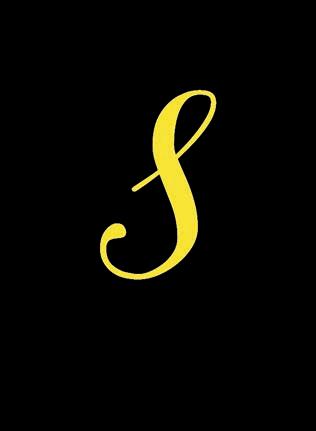

TFNs are unique reference numbers in the Australian tax system. Although TFNs are not compulsory for starting employment, not having a TFN will mean you get taxed at the highest possible rate of 47%. Thus, it is suggested you apply for a TFN as soon as possible if you’re planning to work in Australia, especially since the application process can take up to 28 days The application process is simple and completely online: just go to the Australian Taxation Office website and search up Tax File Number. The form will require some basic information, and within 28 days, your TFN will be mailed to the postal address provided.
USIs are identification numbers that are needed in order to receive your degree upon graduation. They can only be applied for if you are in Australia, but the process is very straightforward. Go to the USI website and complete the form, which takes just a few minutes. Then, the number will be emailed to your inbox. Don’t forget to enter the number into SydneyStudent by logging in and selecting My Details >> Personal Details.
This is an additional and optional form of ID that has your date of birth and photo on it. However, it is quite tiresome to apply for, as you need to download the 'NSW Photo Card Application' form from the Service NSW website and visit a nearby service centre with the completed form and required proof of identity. Furthermore, the Photo Card does have an application fee. However, it does mean you won’t need to carry your passport with you to alcoholic venues and worry about losing it.
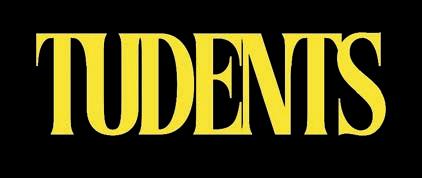

There are a huge number of different clubs and societies you can find through the stalls at Welcome Week. Be sure to look out for events they runthey’re a great way to meet new people and make friends interested in the same hobbies!
The International Student Collective also runs a range of events for international students, like English corners or our very own welcome party! Make sure to follow our socials to keep up to date and chuck us a message if you’re interested in helping out!
13
This is a program where you can match up to 2 buddies from different backgrounds, then learn each other’s language in a relaxed and friendly way.
After signing up you'll get your buddies' information via email. Decide when and where to meet with your partner and join social events such as language exchange parties or monthly catch ups.
The USU Language Exchange also helps your journey by providing materials for language learning and prompts for conversation topics when you receive a buddy.
The Learning Hub offers academic support to any student through a range of different programs. They provide one-on-one consultations with professional advisors who provide guidance ranging from thesis writing to math help to time management.
There's a range of other programs that the Hub offers, such as workshops and drop-in services for both math and English help. Lastly, there is also the Peer Assisted Study Sessions, which are organised and run by fellow students who have completed the unit in previous years. You get to meet fellow students studying your unit and interact in a classroom-style environment.
This semester, PASS is available for the following courses:
ECON1001: Introductory Microeconomics
ECON1002: Introductory Macroeconomics
ATHK1001: Analytical Thinking
MATH1061: Mathematics 1A (including MATH1021: Calculus of One Variable, MATH1002: Linear Algebra)
This grant gives up to $3000 development support for your project ideas that work towards building community. You can get leadership, communication and project management skills with training and mentoring from the University’s Student Life Team. You can apply through the link in our QR code or the University website and there are four different grant streams:
Welcome projects
Maximum funding per project: $3000
General projects
Maximum funding per project: $2000
Sustainability action projects
Maximum funding per project: $2500
Dalyell projects
Maximum funding per project: $2000
Join 6 free workshops facilitated by fellow students, connect with both local and international students, improve English skills and gain useful tips for university life. Register early to secure your spot, complete all 6 sessions to receive a USYD snow globe and a limited edition collective pin.
The University of Sydney’s Careers Centre is here to help you with all things career-related. They offer advice, job search tips, internships, and workshops to enable you in exploring your options and preparing for the job market. You can also book a consultation to get feedback on your CV or LinkedIn profile, so that you’re ready to impress potential employers. It’s a fantastic way to boost your confidence and take the next step in your career.





Kmart offers a wide range of affordable items including housing goods, furniture, clothing, toys, bathroom essentials, and more.

Big W also sells a variety of products like electronics, furniture, and clothes at cheap prices, though it’s worth checking reviews before shopping online to ensure the best experience.
There are two main types of accommodation for students: university residences and off-campus accommodations. These types vary in catering, price and travel convenience. Your accommodation choice may also play an important role in your university life, as closer distance may offer more convenience.



Vinnies in Surry Hills is a fantastic opportunity shop where you can buy second-hand furniture, clothing, and household goods. Every dollar you spend supports local communities and helps people experiencing homelessness or disadvantage.
Market City is a great outlet for budgetfriendly fashion, featuring a variety of factory outlets. Cotton On is a standout with constant discounts on everyday essentials.
Located within Market City, Paddy’s Market is a fantastic place for affordable groceries with fresh products, as well as other great deals.
University residences are self-catered affordable accommodation near campus. Most places reach full capacity well before the start of the academic year, so applications should be submitted as soon as possible. Locations include Abercrombie, Queen Mary Building, Regiment, Darlington House, Sydney University Village, and the new Kensington location in collaboration with UniLodge Kensington. These residences vary in price and some have shared bathrooms and kitchens with single rooms. University residences allow you to engage in social events and create new friendships with others within the building’s day-to-day interactions.
Off-campus accommodation options may include independently operated housing, homestay and privately managed share houses. These are not managed by the university but rather external providers. Independent housing firms typically charge an extremely high rate compared to what the University residences offer. Examples include Scape, UniLodge, and Iglu.

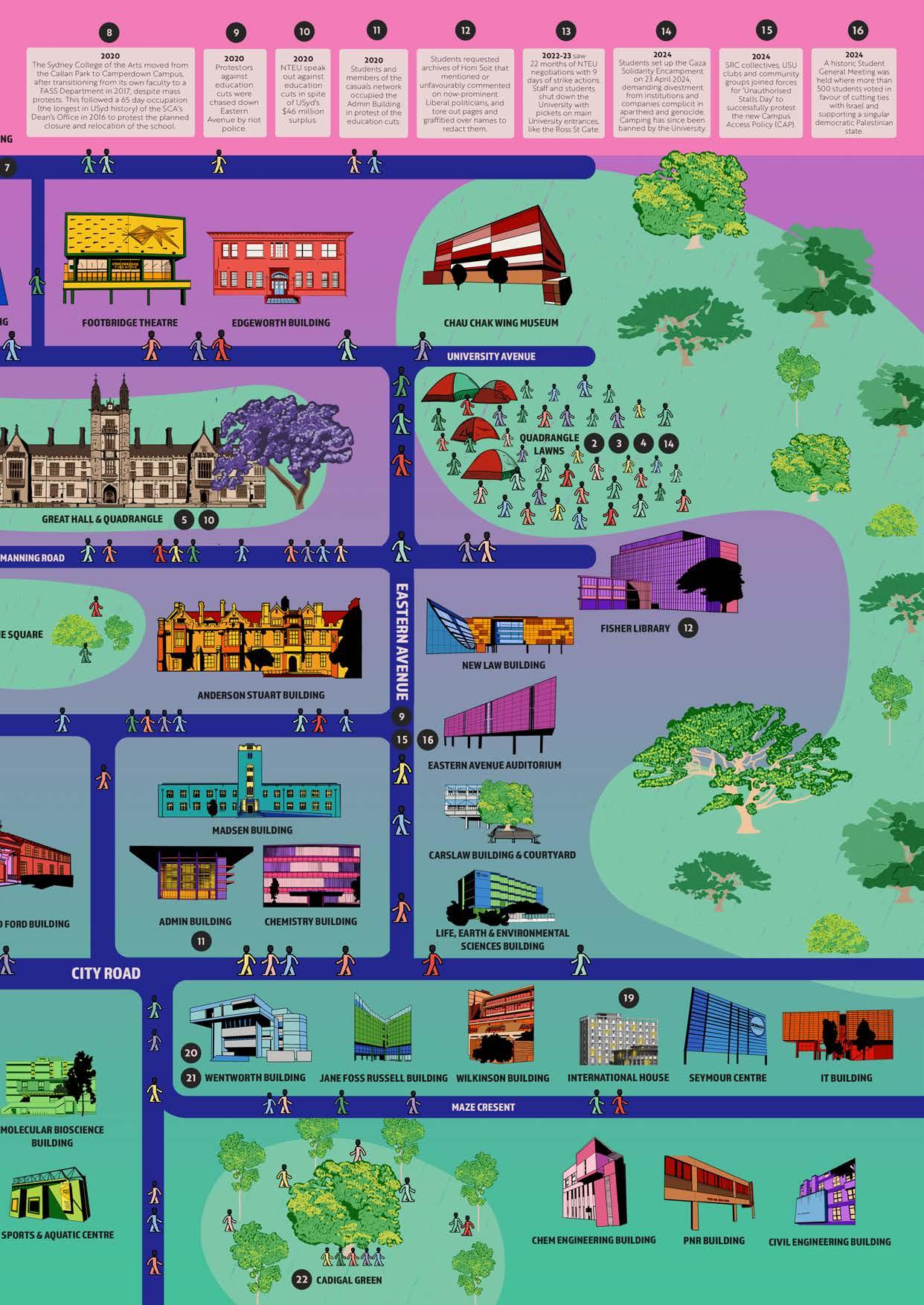
While the SRC is separate from the USU, we are certainly grateful for their Clubs and Societies (C&S) that contribute to campus life. As mentioned in our Faculty Guide (on pages 18 to 24), one common piece of advice is to join C&S related to your studies and to join social clubs to make friends and to complement your degree. These are some of our recommendations!
LANGUAGE AND CULTURAL SOCIETIES
They often have a range of events for speakers of all levels, such as conversation groups, intercultural trivia nights and many food-based gatherings
USYD GARDENERS
Student and community run garden on Gadigal land with weekly gardening sessions and other events

Cat-themed events, competitions and more (including visits to cat cafés!)
Regular jam sessions, other events and performances, and social hangouts
SYDNEY UNI DRAMATIC SOCIETY (SUDS)
SYDNEY UNI RADIO GROUP (SURG)
Weekly reading groups, UPSURGE student journal, intermarxist debate and Heterodox critique
A cultural magazine with a focus on the engaging, niche, and above all else novel stories. Pitch your work for their frequent magazine issues and attend some cool parties
Womn’s Revue, Law Revue, Arts Revue, Med Revue, Engineering Revue, PoC Revue, Queer Revue and Science Revue are yearly sketch comedy shows (revues), written, directed, performed and produced by students
CRAFT SOC
For individuals of any skill level and medium, including Crochet Weeklies, Crafternoon Tea, and Paint & Sip
A very active society with lots of sporty and social events, with discounts to climbing gyms and equipment for members
SIGN SOC
Affordable Auslan classes, games nights, and Auslan conversation groups
Try your hand at USyd’s *fruit salad* of politics-based clubs and societies. As the most active university campus in the country, there are many political clubs and societies to choose from, but there are equally more political groups on campus that are not affiliated with the USU. Seek and you shall find (one way or another).





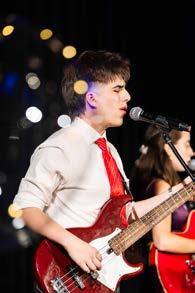
The Conservatorium Students’ Association (CSA) is the representative body of students studying music at USyd, through the Con. With the majority of our classes occurring away from the Camperdown/Darlington campus, the Con holding residence in the heritage-listed Greenway Building (the castle) in the Botanic Gardens, the CSA aims to reignite the spark of student life for music students.



The CSA represents the student body on many Con committees as well as the National Music Students’ Forum and the Australian Music Students Association. We are proudly supporting students through our welfare department which provides exam relief gift bags and hosts other events. Our secretariat and executive council provide students with identity portfolios — offices including queer, Pasifika, First Nations, environment, disability, women’s, ethnocultural, international, and education — to provide voices and spaces for students to feel known and represented, the offices holding events such as the Earth Day picnic, Pasifika morning tea, bake sale for Gaza Children’s Fund, and panels for International Women’s Day. We are lucky enough to have the Con provide spaces to celebrate the rich living culture of the Aboriginal and Torres Strait Islander peoples such as the newly constructed First Nations courtyard.
The CSA is responsible for the inaugural Con Ball, Con Revue (a sketch comedy show), and Conversations, our very own newspaper. We, at the CSA, believe that fostering student culture is an extremely vital aspect to studying in fine arts — our community flourishes with collaboration, change, and celebration of each others achievements, this camaraderie rounding out a true education.
- The 2025 CSA Executive

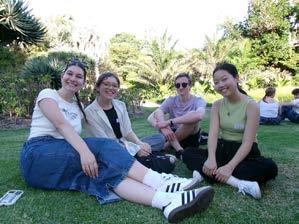
Hello and welcome to the University of Sydney! The Sydney Arts Students Society (SASS) is the official faculty society for students studying the Arts and Social Sciences at USYD! We cater for all students from different backgrounds, abilities and interests, with an aim to provide a vibrant student life experience. We have an exciting line up of initiatives for 2025, from social events such as parties, artsy initiatives and pub crawls, to more career engaging opportunities such as networking events and our three prestigious publications.
We also endeavour to continue fighting to Save the Arts at USYD and defend our staff, education, and freedom of speech. The Arts and Social Sciences are built from a foundation of critical thinking and engaging meaningfully with the world around us, with our subjects allowing for student expression through politics, culture and written development. The fight to prove the value of Arts education is ever ongoing, but we will persist.

Autonomous
Affirmative
Action (AA)
BNoC
Caucus
Council
Faction
Getting
CAPped
Hack
Headkicker
Lecture bash
Negging
National Union of Students (NUS)
Organiser
StuJo
StuPol
Sectarian
Shitkicker
Staffer
Stooge


Autonomous collectives or events are reserved for people belonging to the respective group, e.g. Queer people, People of Colour, disabled people
Affirmative Action refers to non-cisgender men and is required for at least 50% of the people fulfilling each role in the SRC, e.g. at least 1 man and 1 non-cis man, or 1 man and 2 non-cis men
= Big Name on Campus
The meeting of a faction or a particular group within faction to discuss strategy, often weekly
Political sparring and the debate of strategy and orientation for the SRC through reports and motions. Sometimes fruitful, sometimes a shitfight
The parties or groups part of student politics, often linked to federal parties or national groups
Having the new ‘Campus Access Policy’ (CAP) enforced on you, as seen with bake sales for Gaza getting shut down, or enduring student misconduct investigations for using a megaphone
A pejorative term describing a person who is more loyal to a particular political party than to their own sense of ethics. Equally, one can be “stupol hack”
A top dog within a faction or group who leads and whips people into shape, and the go-to person for representatives of other factions
Announcements to lectures or tutorials before the class starts about upcoming events or elections
Negotiations (negging or negs) occur between representatives of factions, often around supporting certain motions or electoral deals
Cursed by a ‘sweetheart’ deal between Labor factions that maintain a Labor-student dominated union each year, leading numerous student unions to threaten disaffiliation until the NUS can do something productive and not just be virtue signalling, career boosting, and arguing between the three main groups (Labor Right, Labor Left and Socialist Alternative)
A lead person in a group or political space that organises people, events, movements, campaigns
= Student Journalism
= Student Politics
Sectarian fights occur between faction for the sake of dissing another group, rather than genuine political criticism
Those who follow the headkickers, often bossed around and doing the dirty work
Staffers work for representatives or political parties, and are very common within student politics
During elections, you may be approached by someone claiming to be a ‘real’ student unfamiliar with StuPol, who is actually from a faction and trying to trick you or gain intel. Stooge! (but there’s more)
For more resources and advice, check out the srcusyd.net.au website or SRC office, and the Women’s Collective’s Growing Strong, the QuACtivist Handbook, and SRC Disabilities Collective and SUPRA Disability and Inclusion Network’s Accessibility Handbook
For a comprehensive list of hotlines and community resources compiled by the 2025 Sexual Violence Officers, use the QR code here:
Any questions or want to get involved? Check out the SRC and collective social media pages or feel free to email us at general.secretary@src.usyd.edu.au
Turn the page or flip this Handbook over to find the Education Action Group’s Countercourse, with articles about activism and politics in the SRC and beyond